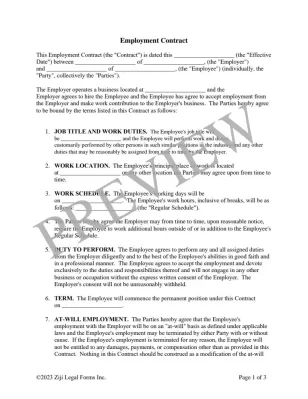Get started with your

Free Employment Contract
An employment contract is an agreement between an employer and new employee that sets out terms of job.
It is also sometimes known as Employment Agreement which clearly outlines roles and responsibilities specific to job duties performed by a new employee as well as the remuneration and benefits.
Click Create Document and let us get you started with your employment contract. Just answer a few simple questions, revise as many times as you want and download your free PDF within minutes.

SIMPLE
STEPS
STEPS
Answer simple questions
Review and download your document
Print and sign instantly
